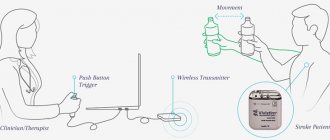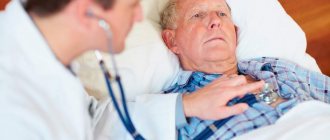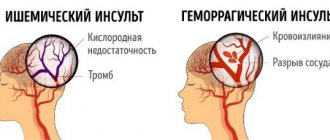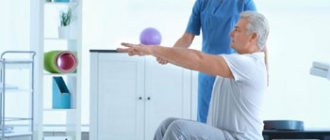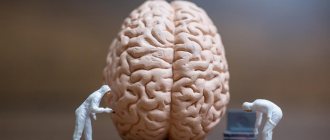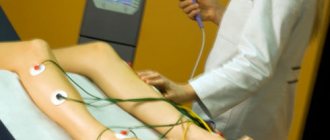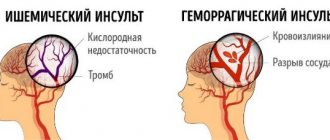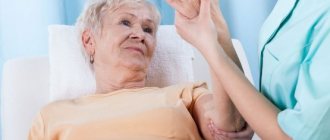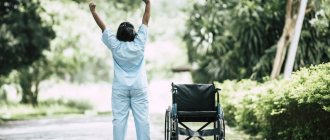Human long-term and short-term memory can be compared to a modern information repository, in which it is easy to find the necessary data.
- Why do memory impairments occur after a stroke?
- What are the manifestations of memory impairment?
- What is the danger of memory loss after a stroke?
- Is memory restored after a stroke?
- How long does it take to recover memory after a stroke?
- Care and recovery after a stroke at the Harmony House nursing home
Relatively speaking, all actions are reproduced by the brain on the basis of collected, processed and applied information, which must be ensured for safety in any situation.
Thanks to active thought processes, a person identifies himself, remembers how to walk and talk, eat and chew. Unfortunately, a disease such as stroke in older people can lead to the loss of certain areas of memory, which leaves a negative imprint on every moment of life after a stroke.
Why do memory impairments occur after a stroke?
The consequence of a blockage or rupture of a vessel is a stroke, and a person can suffer such a condition on his feet without noticing any changes. In some cases, the circulatory system suffers, which cannot deliver oxygen-enriched blood to a certain area of the brain and the cells of the cortex gradually die.
Cellular necrosis and lack of proper medical care remain the main causes of deterioration in health after a stroke. Against the background of such complications, partial or complete paralysis, immobilization of facial muscles and drooping of the corner of the mouth or eye, speech dysfunction and memory loss develop.
If the problem is noticed in a timely manner and qualified recovery after a stroke , it is possible to avoid the consequences. This situation is due to the fact that when a certain part of the brain is inactive, living cells can perform additional functions after a rehabilitation program.
It is impossible to predict the consequences of a stroke, but immediately after diagnosing such a condition, doctors can provide the necessary assistance. And by organizing proper care at home or placing an elderly person in a special rehabilitation boarding house, you can restore all lost body functions.
What are the manifestations of memory impairment?
Modern medicine proposes to consider human memory on the basis of two components that play an important role in its formation. These are short-term and long-term memory, responsible for the safety of ever-memorized information used in mental processes.
After a stroke, memory loss of various types can be diagnosed, and after such a diagnosis, the recovery process can begin with an individual selection of techniques:
- verbal memory impairment;
- visual memory disorders;
- loss of motor skills;
- disturbances of emotional-figurative memory.
The most complex and difficult to recover cases include vascular dementia, which cannot be cured. Such a diagnosis cannot be considered as a death sentence, although elderly people with dementia after a stroke completely lose adequate perception of the surrounding reality. With a properly selected course of rehabilitation and well-carried out recovery, it is possible to slow down the process of deterioration of a person’s condition and adapt it to reality.
Medical certificate
Cognitive (i.e. cognitive) functions:
- attention (understands a person’s ability to maintain the level of mental activity necessary for cognition);
- perception (the ability to construct, based on information that enters the brain from the senses, integral images and ideas);
- gnosis (implies the ability to understand formed images and associate them with categories of the mind);
- memory (the ability to remember, store and reproduce provided information);
- intelligence (understands the ability to perform actions with acquired information, i.e. perform analysis, comparison, evaluation, generalization, apply in solving problems);
- speech (implies the ability to communicate through a symbolic sign system, i.e. language);
- praxis (the ability to form and include motor skills in activities, build, memorize and automate a sequence of movements).
Cognitive impairment refers to a decrease in memory, mental performance and other cognitive functions. Comparison is made with the individual norm.
Appear as a result:
- local brain damage;
- decompensation of previous cerebral disease;
- development of acute encephalopathy.
Clinical picture depending on the location of the affected area (brain lobe):
- anterior frontal
– violation of planning and control;
- posterior parts of the left frontal
– Broca’s aphasia, apraxia (the patient can outline a plan of his actions required to perform a complex motor act, but is not able to perform it);
- left parietal
– associative aphasia, ideomotor apraxia (cannot outline a plan of sequential actions to perform a complex motor act), Gerstmann syndrome, body diagram defects, alexia, agraphia;
- left junction of parietal and occipital
– optical-spatial agnosia, acalculia, constructive apraxia (cannot form a whole object from its parts);
- right parietal
– anosognosia, ignoring ½ space;
- left temporal
– Wernkike aphasia and/or amnestic type;
- right
– amusia, dysprosody, arrhythmia;
- occipital left
– optical-object agnosia, isolated alexia;
- right occipital
– facial, visual color agnosia;
- hippocampus, thalamus, mediobasal frontal
– amnesia.
Symptoms:
- deterioration in concentration;
- defects in executive functions in the form of decreased intellectual flexibility (manifested by inertia, perseveration) and cognitive control (impulsivity appears);
- constructive dyspraxia;
- bradyphrenia;
- memory impairment in terms of incomplete reproduction.
The medical and social significance of the deviations lies in the decrease in the patient’s performance and the emergence of problems with everyday and social adaptation after a stroke. This negatively affects the quality of life of both the elderly and their family members. Due to a decrease in the effectiveness of neurorehabilitation, a poor prognosis regarding the completeness of functional restoration is given. The effectiveness of therapy and prevention of the main and concomitant diseases also decreases. As a result, life expectancy decreases.
What is the danger of memory loss after a stroke?
The extent of the destructive impact of a stroke on the memory of an elderly person is difficult to assess without an accurate diagnosis. It depends on the intensity and area of hemorrhage or the number of dead cells in a certain hemisphere of the brain, so rehabilitation procedures should be started immediately.
The problem of memory loss manifests itself in the difficulties faced by older people who cannot identify themselves. They do not remember their childhood and adolescence, they lose their walking skills and coordination of movements, they do not understand how to eat or carry out basic hygiene.
Another dangerous point is psychological discomfort, depression and anxiety in older people. After memory loss, an elderly person sees unknown people and unfamiliar objects around him; everything seems alien and frightening to him, which can cause psycho-emotional breakdowns.
Is memory restored after a stroke?
Destroyed neural connections can be restored and this will provide the opportunity to partially or completely restore a person’s memory.
But for this it is necessary to create optimal conditions and develop a set of techniques, regularly conduct classes and monitor the current state of health of an elderly person:
- systematic memory training and activation of thought processes;
- drug therapy using memory improving drugs;
- using intellectual games and exercises to strengthen memory.
Classes and exercises should not overload the brain; in a person’s life it is important to find time for rest and entertainment. A specialized private boarding house for the elderly in the Moscow region offers unique and individually adaptable rehabilitation program complexes for people who have suffered a stroke.
How long does it take to recover memory after a stroke?
Rehabilitation procedures after a stroke carried out by specialists at our private boarding houses include an integrated approach. This means that in addition to memory restoration, psychologists work with patients to help stabilize their psycho-emotional state and return to normal life.
The process of memory restoration and its duration depend solely on the diagnosis and the degree of destruction of the neural network. It is very important that the patient immediately after a stroke begins to undergo a rehabilitation course and follows all the doctor’s instructions so that the changes become reversible.
Having lost memory and part of cognitive abilities, a person feels disoriented and often becomes depressed. For older people, it is important to organize optimal conditions for therapy and create comfortable psychological conditions under which rehabilitation will be as effective as possible.
Restoration of motor functions
Often, after suffering an apoplexy, the patient loses his previous motor activity in full or in part. For example, hand motor skills suffer, movement coordination is impaired, and limbs do not move. Doctors also strongly recommend that you strictly adhere to bed rest for the first time and not get up, even if you have the strength to do so. The best option would be to sit on a special bed or use pillows to warm up your arms and legs.
It is useful to use therapeutic massage , which can only be performed by a qualified master. It can be general and complex in nature or affect a specific muscle group. It is also important to develop muscles, which will be an excellent barrier to the appearance of spasms and pain. If the client is unable to move parts of the body, then a passive version of gymnastics is used.
It is important to understand that physical therapy, massage sessions and feasible physical activity alone will not be enough to restore lost motor activity. It is important, along with them, to use professional equipment. For example, by applying current pulses, it is possible to stimulate the affected areas and bring them back into active tone.
Baths and applications are also used as additional measures to improve blood circulation. The doctor may prescribe medications to relax muscles, eliminate pain and spasms. Pay special attention to the person’s face and facial expressions. In case of pinched nerves or paralysis, facial expressions change noticeably. You can cope with its restoration with the help of simple exercises. You should do gymnastics for your eyes and mouth, make a wide smile, pronounce various sounds, squint your eyes tightly and relax your eyelids.
Care and recovery after a stroke at the Harmony House nursing home
The rehabilitation programs used by our specialists include all the necessary measures to restore memory and cognitive processes.
The Harmony House network of private boarding houses for the elderly specializes in providing quality medical services for their residents:
- compliance with the conditions of therapy and rehabilitation;
- psychological comfort and calm environment;
- constant supervision by experienced caregivers;
- assistance in hygiene procedures, feeding;
- Qualified doctors work with patients.
During rehabilitation and socialization, qualified psychologists actively work with elderly people living in boarding houses. We maintain a friendly and relaxed environment, provide leisure activities and experienced staff to provide assistance to people in dire need.
A stroke in old age can be suffered on the legs, but lack of treatment and rehabilitation can lead to the development of various consequences. Our network of boarding houses provides high-quality and targeted care for the elderly in Moscow and provides individual rehabilitation services for residents.
Rehabilitation of the patient at home
Before the patient is discharged from the hospital, relatives receive recommendations on caring for the patient after a stroke. Recommendations for rehabilitation will be provided by the attending physician. The rehabilitation exercise program is performed every day without breaks, 2-3 times a day. Performing physical exercises should not tire the patient or cause him pain. Exercises in a sitting position help prepare the patient for walking.
When the condition improves, exercises are performed in a standing position; they help eliminate neurological disorders as much as possible by restoring fine movements. The patient performs exercises with an expander. From a standing position, he bends down and picks up a matchbox from the floor. Performs breathing exercises with raising your arms up while inhaling, standing on your toes, then lowering yourself onto your entire foot, lowering your arms, exhaling, leaning forward. A comprehensive recovery program is aimed at reducing muscle tone, improving blood circulation, preventing joint contracture, restoring and maintaining fine motor skills, speech, preventing the formation of bedsores and the development of inflammatory processes.
The Yusupov Hospital uses modern rehabilitation methods, uses various types of exercise equipment, and physical therapy exercises. Rehabilitation doctors develop an individual rehabilitation program for each patient.
